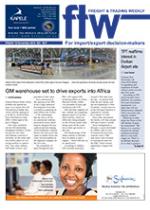Thanks to huge advances
in refrigerated technology,
shipping lines are making
major inroads into
airfreight’s previously
exclusive domain.
With modern
containerships and
sophisticated, everexpanding
trade networks
providing easier global
access for new products to
new consumers in new and
established markets, the
world is becoming a smaller
place, in the view of Thomas
Eskesen, Maersk Line’s
senior director for reefer
management.
In South Africa on a meetand-
greet mission recently,
Eskesen outlined news many
would have considered total
fantasy a decade or so ago.
Imagine shipping fragile
products such as live lobsters
and bananas in reefers.
Well, Maersk Line is doing
that successfully and has
added to its list of ‘doubtfuls’
sashimi grade tuna, mussels,
crabs, blueberries and even
fresh-cut flowers – the latter
once an exclusive airfreight
product.
What reefer shipping has
achieved is cutting routes
without cutting corners.
Maersk has introduced
Aqualife, which allows for
live Canadian lobsters to be
shipped to Europe in fortyfoot
reefers on a voyage of
ten to 12 days, promising a
considerably reduced carbon
footprint over airfreight.
Equally bananas, which
don’t flourish in normal
refrigerated conditions,
are now shipped in reefers
utilising StarCare technology
and guaranteeing freshness
for up to 50 days.
Maersk Line, like many
other carriers, is sensitive
about imparting what may
be considered ‘sensitive’
information but it is
generally accepted that the
carrier facilitates about one
third of global reefer trade.
Eskesen says Maersk
Line, trading in more than
120 countries, is intent on
maintaining its global status
and remains focused on 10%
growth in the year ahead.
“This has been a very
robust year, following on
2008 (the global depression),
as things started returning to
normal.
Seafreight makes inroads into airlines’ domain
19 Nov 2010 - by Ray Smuts
0 Comments
FTW - 19 Nov 10

19 Nov 2010
19 Nov 2010
19 Nov 2010
19 Nov 2010
19 Nov 2010
19 Nov 2010
19 Nov 2010
19 Nov 2010
Border Beat
16 Apr 2025
